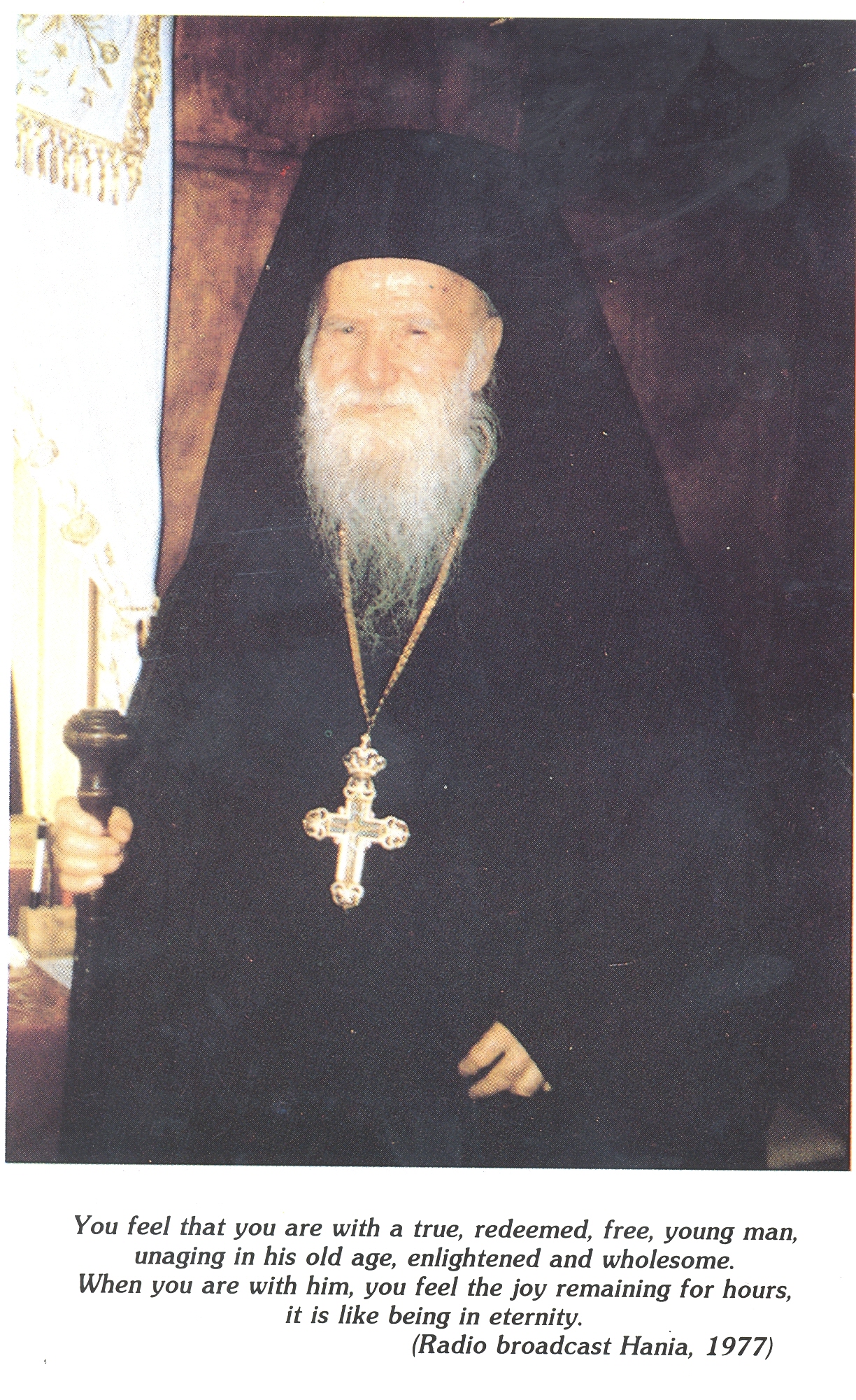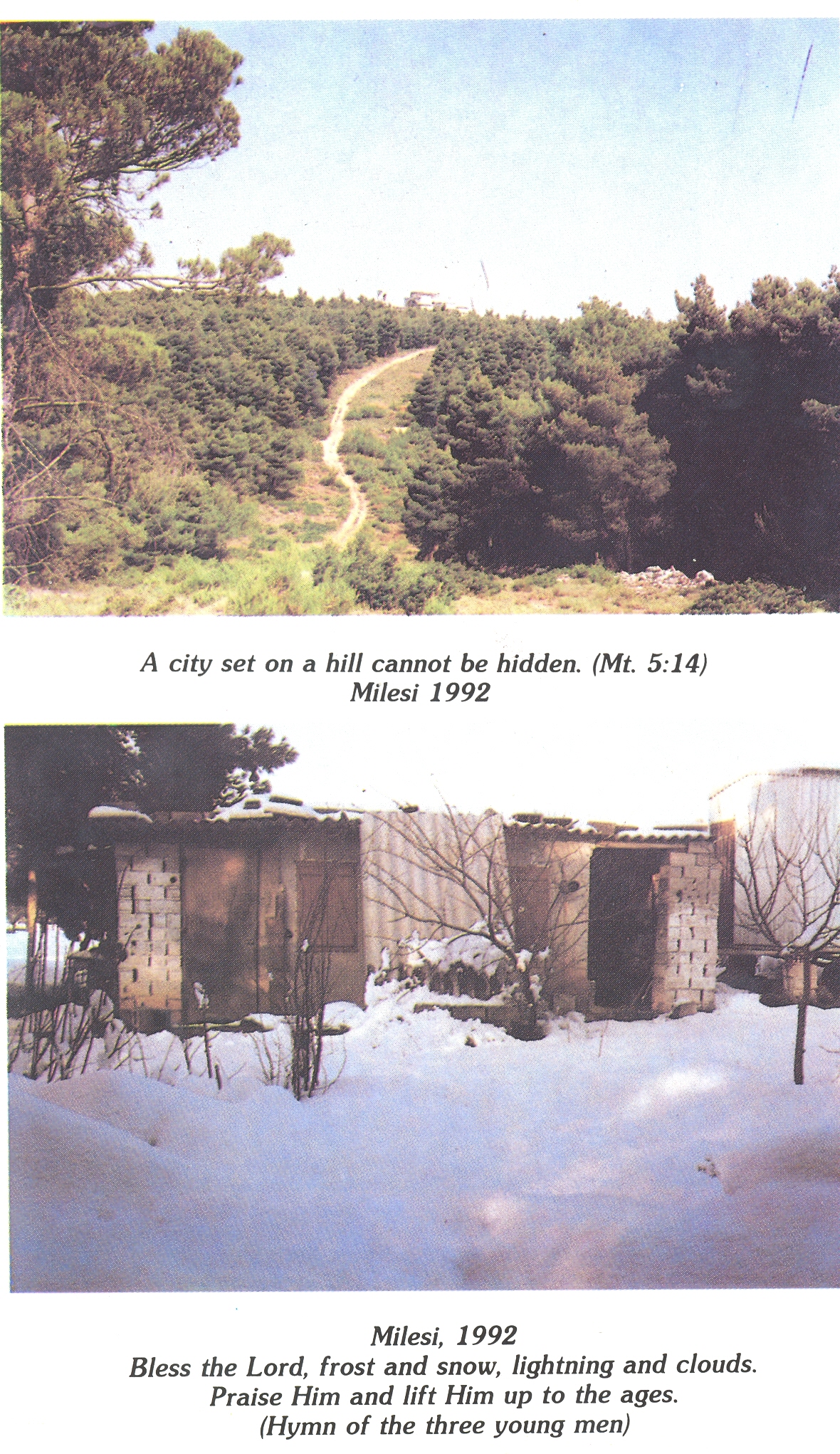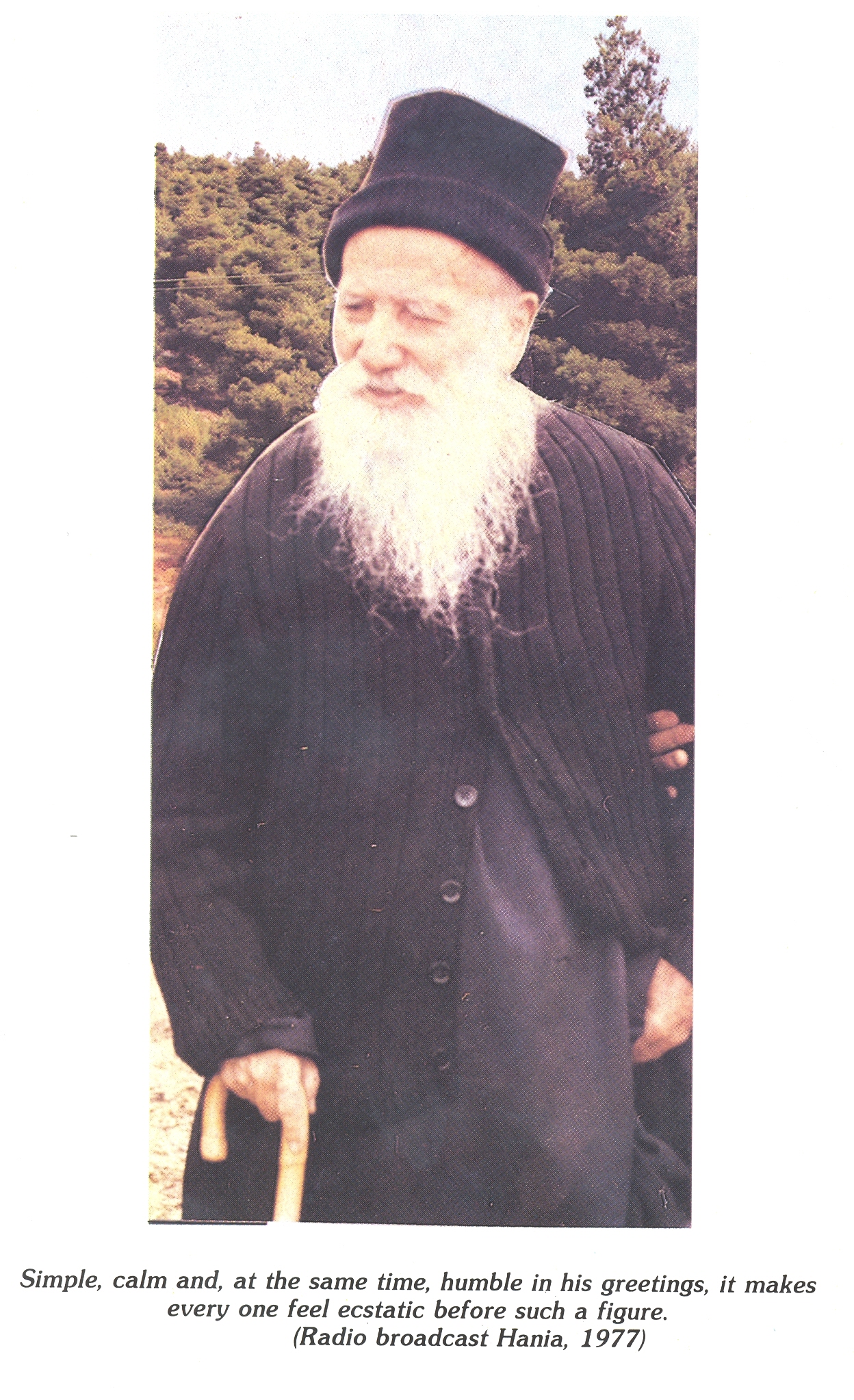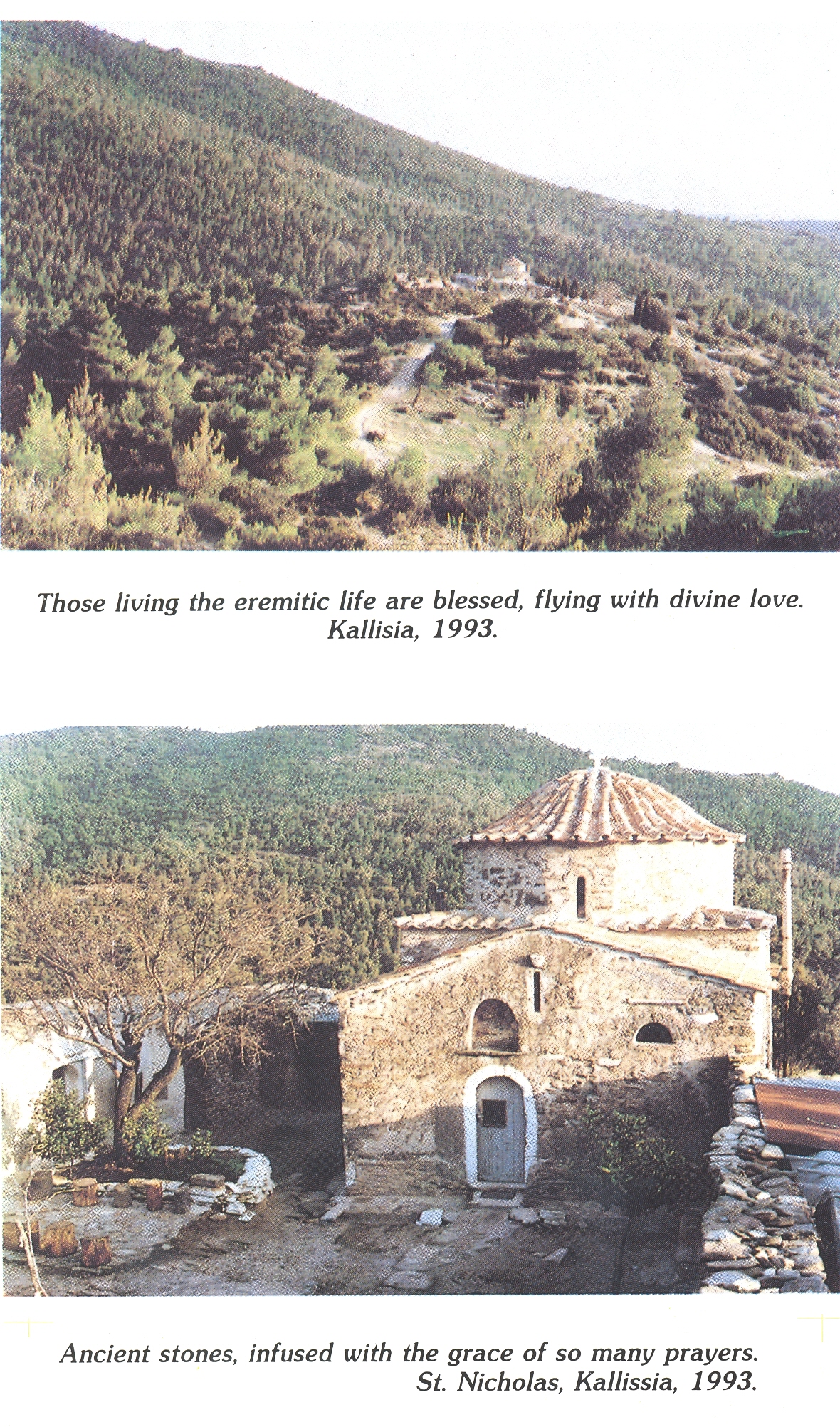 |
Orthodox Outlet for Dogmatic Enquiries | Digital Books |
|---|
Previous // Contents // Next
ELDER PORPHYRIOS
Testimonies and Experiences
Talks about Elder Porphyrios
Constantine Scouteris
Professor at the Theological School of the University of Athens
=============================================================
Excerpts from a radio program dedicated to Elder Porphyrios broadcast by the Radio Station of the Church of Greece, on the 19/12/91.
Published here with the permission of the speaker.
Before referring to certain characteristics of Elder Porphyrios'
personality, I would like to express two reservations of mine.
My first reservation is that we can't talk about spiritual things, about
spiritual figures, about the friends of God, easily. Only saints talk about
other saints or the same saints talk about themselves. When we talk about
people who have left their mark on the lives of many fellow humans, there is
the danger that we might become garrulous. There is the danger of saying
things that are completely superficial, precisely because, concerning
spiritual matters, the words of St. Gregory the Theologian hold true,
"Understanding is difficult, expression is even more difficult." How can one
talk about that which so many people experienced near to Elder Porphyrios?
It cannot come across in a radio program. I say this, because it is
necessary for our listeners.
I remember that two highly placed individuals (not Greeks) had once asked me
to take them to the Elder. They spoke Greek and remained in pappouli's cell
for about an hour. Later when they had returned to Athens, one of them
turned to the other, and asked:
"How do you feel?"
"Full of joy, great joy. And you, How do you feel?"
"Full of joy, great joy."
That kind of experience doesn't come across on a radio station. The joy
which was experienced by hundreds and thousands of people when near to
pappouli can't be felt over a radio network.
Consequently we are now in some way endangering something. Instead of
drawing the Elder's image as it should be drawn, we are in danger of
distorting it. Our listeners must realize that when we speak, our words pass
through human mediocrity. We use conventional language. We mention a few
things, whatever we saw with our blind eyes, nothing more.
This is my first reservation, that we can not talk about spiritual matters
easily.
My second reservation is that the Elder didn't want, to put it simply,
publicity. He was a man who lived in his cell, in his Church. Humbly.
Quietly. It is precisely this quietness, this living in absolute peace, that
shows in his death. There were no strangers there, only the monks of
Kavsokalyvia. A true passing of a humble hieromonk.
With these two misgivings I can now go on to say something.
In answer to the question about who the Elder was, one could say something
very simple. He was a man of God. What does 'man of God' mean? He was not
just a man of God in the everyday sense of the word. He was also a man of
God in the fundamental sense of the word. What do I mean? 'Man of God' was
the name given to a prophet in the Old Testament. 'Man of God' in the New
Testament is the saint. Men of God were people vested with His Spirit. The
complete man, as Paul puts it, the man of God.
His whole orientation was towards God. In the letter which he wrote to his
spiritual children, it is typical of him to have emphasized precisely this:
"I pray that my spiritual children will love God, who is everything." His
concern was God, who is everything. Nothing could come between them. Nothing
could cut off this relationship, this communion. His whole being was soaked
in God's presence. God was the center of his interest. His only concern:
God. His love for the study of theology was unbelievable. He hadn't studied
theology, or rather he studied theology in the desert, in the great school
of the desert. He loved to read theological texts. For example, from
hymnology he liked the hymns to the Trinity, or the hymns of Theoctistus the
Studite from the Canon to our Lord Jesus Christ. These troparia are
representative of those which he liked.
I can mention one: "All that is divine sees and foretells through the Holy
Spirit. He works the highest wonders, praising One God in Trinity. For
although thrice-brilliant, the Divinity rules as One."
He read it and re-read it and his soul rejoiced. Or the other one, about
Jesus, "O Sweetest Jesus, the joy and gladness of my soul..."
God was the center of his being. He would typically say, "God is the most
ultimate desire, the unending end. We love many things, we want many things.
God, however, is the most ultimate desire."
The Elder had divine love (eros). The divine love that truly has spiritual
meaning. Divine love doesn't have any connection with passionate human love.
It's another order of reality, another actuality.
This divine love finally led him to, what? It led him to the glorification
of God. He constantly glorified God. Indeed,
I shall use one of St. Symeon the New Theologian's terms. His glorification
was maniacal.
When he received divine grace, at Kavsokalyvia, while still a young man, he
knelt down in the wilderness and shouted, "Glory to You, O God. Glory to
You, O God." Maniacal, with excessive enthusiasm.
Therefore, the first attribute of his spiritual personality is love of God.
If I may mention a second attribute: The Elder was Church centered. The
Church was the basis of his whole life and works. In fact I often saw him
dissolve in tears, when talking about the Church. He was full of absolute
respect for the official Church. The bishop was in the place and type of
Christ. He was unbelievably upset when he saw people criticizing the bishops
and denouncing them in writing. The bishop is the head, whatever he may be.
This was a sacred matter for the Elder.
He spoke about the Church. How did he see the Church? He would
characteristically say, "The Church is uncreated." Why is it uncreated?
Because the Church is theanthropic, it is God in History. And we, the
faithful, are called to be uncreated, to become partakers in the divine
energies of God, to enter into the mystery of Godliness, to overcome our
worldliness and to become transcendent. The Church is uncreated. It's
characteristic of him that he put it into practice. He received everybody.
His door was open to all. He was not biased. He received whosoever went
there, regardless of where they may have belonged. He himself didn't belong
anywhere. He belonged to the Church and he accepted everyone.
Certainly, the Elder didn't say everything to everybody. Why? Because he
often felt that someone wasn't ready for him to tell them something. He
didn't say it then, but waited for them to be prepared, before he told ihem
something. What he said when at the end of his earthly life is impressive,
remarkably impressive. What did he say? He said the prayer of the Lord, the
prayer of Christ on the eve of his crucifixion, "That they may be one." With
his holy lips, he closed his life story here on earth, with the phrase,
"That they may be one".
That is to say, that the Elder's prayer was identified with Christ's prayer.
What did the Elder mean? Did he mean that his children should be one? Did he
mean that the Orthodox Churcn should be one? Did he mean that the world,
Christianity, should be one? Whatever he meant, you can see his ecclesial,
his Church centered frame of mind.
Certainly, many misunderstood him and even used his name to express their
own opinions. As could possibly happen now after his death. Those of us who
knew the Elder can confirm without doubt that he was faithful to the Church.
One more factor of his spiritual personality is that the Elder was an
ascetic. He was vigilant. With his humble little cassock and his humble
little meals! Nothing else. He was an ascetic. He started off from
Kavsokalyvia and as many people have said, when he came to Athens he brought
the desert with him. What the Elder did was original.
We knew about monasticism. We knew about the angelic life from ascetic
works, from books. We saw it in the Elder's face in Athens. Can I make a
confession? I saw him for years and I had the impression that I had an angel
before me. An incarnate angel. That's the monastic demeanor, the angelic
life. That is what the Elder brought to Athens. He brought the Jesus prayer
into Omonia Square! Yes, the Jesus prayer in Omonia Square! It is
characteristic that noetic prayer is not only confined to monks, but he
believed that people in the world can practice it too. Somebody went to see
him. He would stop for a while and say, "Lord Jesus Christ..." His whole
life was an unending prayer.
Someone can certainly talk about humility, obedience, and fasting. These are
the very elements of his personality that truly made him wise and sober.
I can specifically talk about his love and his obedience. Besides, it is
something which he himself wrote about in the letter that he left to his
spiritual children. He went to become a hermit out of love. He read the life
of St. John the Hut-dweller and went to Mt. Athos out of love. He says that
he was obedient to his Elders, that he gave them absolute obedience.
Absolute obedience.
That 'absolute' means blood. It means struggle. Spiritual things don't
happen without suffering. Spiritual things don't happen just like that. Here
I must add that the Elder certainly didn't seek after gifts. No. He sought
after the love of Christ, nothing else. The goal of a monk, the goal of a
Christian is not to receive gifts from God. It is love. This movement, this
exodus from selfishness. This exodus and loving communion with God. That's
it and that's what the Elder did. The gifts came later, presents from God.
This is the way he saw it.
These gifts are truly the fruits of patience and suffering. He had all the
illnesses you could think of. He never prayed for God to make him well. He
didn't pray for his own relief. He glorified God. Whatever God brought his
way, he glorified Him. He was in a lot of pain and had many illnesses but he
never asked God to take an illness away from him. This is characteristic of
him. It showed us a man who had surpassed the realm of the human experience.
We hurt a little and we want the pain to leave us immediately. The Elder
didn't have that mentality. He glorified God while suffering in pain,
because he thoroughly believed that our life is a period
of preparation. He would say that we must start from here. We must start
now.




.
____________
Previous // Contents // NextArticle published in English on: 23-2-2009.
Last Update: 23-2-2009.